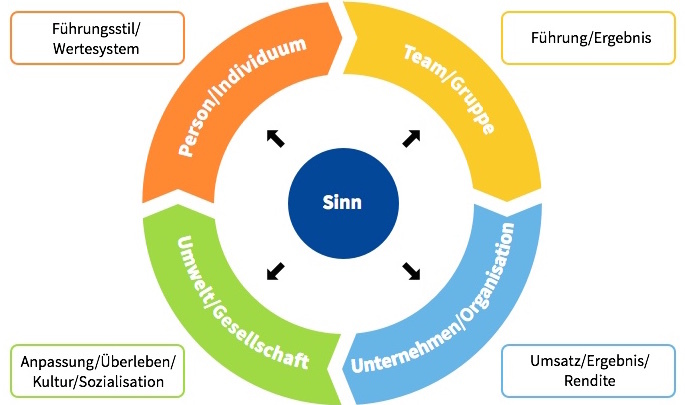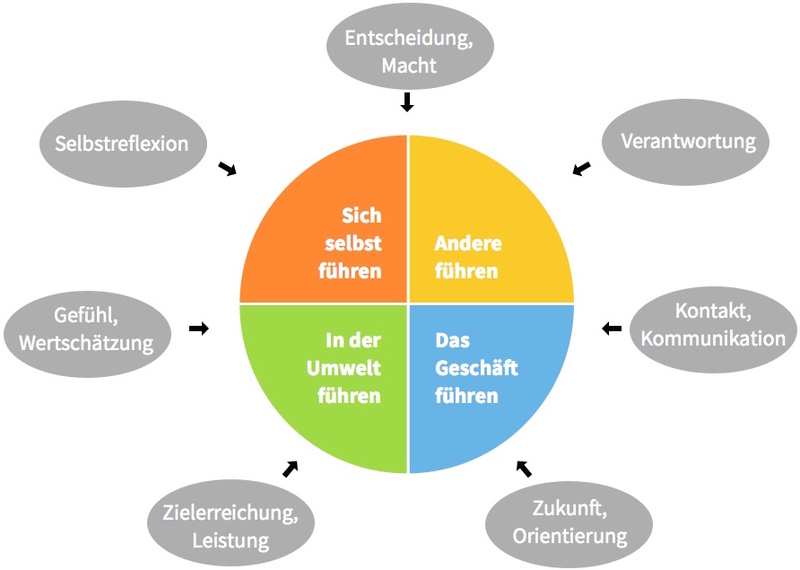Academic Research
Up to date Research: Spheremodell of systemic Leadership
 Fig. Sphere Modell of systemic Leadership by Daniel F. Pinnow 2014
Fig. Sphere Modell of systemic Leadership by Daniel F. Pinnow 2014
The systemic approach to leadership considers managers, first and foremost, as a part of a complex system, which is constantly at change. It does not consider the art of leadership as one who manages these systems themselves, but rather one who manages the relations and networks within these systems.
In doing so, a systemic leader does not focus on the superficial symptoms of the system, but rather looks at what is happening underneath its surface. He or she analyzes the factual, social and timely patterns and processes out of which the system consists. This enables a systemic leader to lead his staff in an indirect way, rather than being directive and patronizing.
In this spirit, leadership means creating a world in which others want to be a part of. More concretely, a CEO who is leading his staff according to the systemic approach, would not just delegate tasks, but rather see what can be done and influenced together with his managers and workers in order to steer the company in the right direction.
Published in: Whitepaper: „Sphären Modell“ der Systemischen Führung, Daniel F. Pinnow, April 2014
Academic Research 2011: Systemic Leadership in the "VUKA World"


Fig. The 4 Interaction Levels of Leadership by Daniel F. Pinnow, 2011 Fig. The 7 Core competencies of Executive Coaching - Prof. Daniel F. Pinnow, 2011
In this evolution of the original research approach of 2005, the leadership understanding consists of seven core competencies that a leader must bring with him when he wants to stand up in the energy square: "I myself - my company - my team and my employees - my environment". Success has, who does not stay with failures and mistakes, but future-oriented looks forward, makes decisions and takes responsibility. In order for this action and decision to be in harmony with other systems, lifeworlds and fellow human beings, the executive must be in contact with others, who can reflect their own thoughts and actions and above all, communicate well. All this is only possible if she can not only guide and guide with numbers, data, facts, but also gives respect and attention to the emotional level. Anything but easy. But a wide field on which one can prove himself.
Published in: Unternehmensorganisationen der Zukunft - Erfolgreich durch systemische Führung, Daniel F. Pinnow, Campus Verlag, 2011
Research Approach 2005: The leader as part of the system
 Fig. Systemic Leadership - Daniel F. Pinnow, 2005
Fig. Systemic Leadership - Daniel F. Pinnow, 2005
In this fundamental approach to systemic leadership, first developed by Daniel F. Pinnow in 2002 and published in 2005 in his book "Leading - What really matters," a leader sees himself above all as part of a complex system that grows constantly changed. The art of leadership is not to manage this system, but its relationships.
To do this, a systemic-thinking leader deliberately turns his attention away from the superficial symptoms of their system. Modern leaders go one level deeper: they analyze the factual, social, and temporal patterns and processes underlying their respective systems. With these insights, she guides her employees indirectly and from within the system rather than directly and from above.
In this sense, modern leadership, according to Daniel F. Pinnow, means: "To lead means to shape a world that other people would like to belong to".
Published in: Führen – Worauf es wirklich ankommt, Daniel F. Pinnow, GablerSpringer Verlag, 2005











